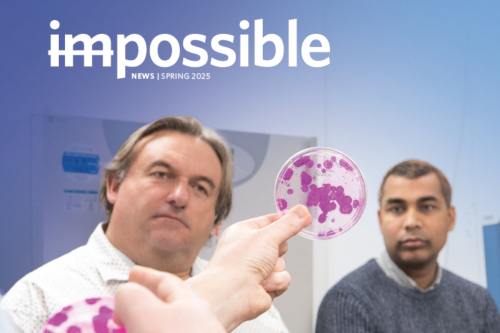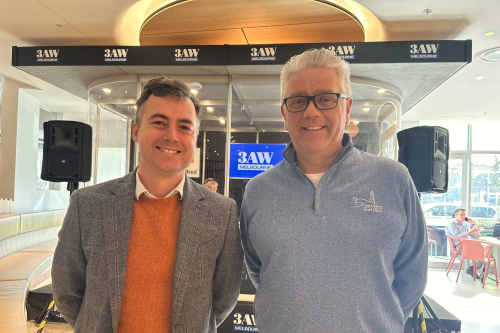Help support Karen for our Critical Care Appeal this year

Imagine being on the trip of a lifetime with your family, only to return home and hear the devastating news that you have cancer, and the situation is so serious you need to stay in hospital and commence treatment immediately.
Just 12 months ago, this was the reality for 32-year-old Karen who was told she had ‘double hit lymphoma’ and, without any preparation, had to urgently start treatment the same day.
Sadly, her initial treatments weren’t successful. With every treatment, she needed to have Positron Emission Tomography (PET) scans to assess if they were working.
A PET scan, which takes between 60 and 90 minutes (sometimes waiting for hours while the tracer localises to the cancer) and requires the patient to be injected with radioactive dye, is critical in helping doctors observe changes in the size and activity of tumours.
In this year’s Critical Care Appeal, we are attempting achieve an Australian-first in cancer – installing the world’s newest and most powerful scanner in a public hospital. Your donation today is critical to this revolutionary leap in the detection, treatment and prevention of cancer.
This new machine, that is at least 10 times more powerful and consequently dramatically reduces the amount of radioactive dye patients need, detects even the tiniest cancer sites. It can scan the whole body at once – which current scanners cannot do – and it can achieve all of this in just minutes, not hours.
Called the Biograph Vision Quadra (PET Quadra for short), currently there are none in an Australian public hospital used only for cancer and only one in Victoria (in a private facility).
We are incredibly grateful to the Australian and Victorian Governments who also support this vision, committing $19m, but we still need an extra $5m to purchase and install the machine.
The PET Quadra will be installed in the Paula Fox Melanoma and Cancer Centre at The Alfred, a new world-class cancer centre which opened to the public in June this year.
According to The Alfred’s Director of Oncology, Professor Mark Shackleton, the PET Quadra will drastically broaden the horizons in understanding cancer and how to treat and prevent it.
“The significance of having the most powerful PET scanner in the world in the Paula Fox Melanoma and Cancer Centre at The Alfred, will mean a transformative shift in the detection, treatment and cures for cancer patients,” Prof Shackleton said.
“Its impact will be revolutionary and the outcomes will have far-reaching benefits for all people living with cancer; not just in Australia, but globally.”
Karen was lucky enough to access the only PET Quadra currently available in Victoria, and was emphatic when comparing it against a normal PET scanner.
“(It) is absolutely amazing. I've never seen anything like it. Honestly, The Alfred having one would make such a big difference for patients like me,” she said.
Beyond benefits for individual treatment, the revolutionary technology will enable extraordinary developments in research and clinical trials, Prof Shackleton said.
“The Alfred already undertakes the most clinical trials in the country, one-in-five, and in cancer specifically – having this PET scanner is likely to double our clinical trial capability,” he said.
“This gives us a significant ability to innovate and bring new medicines into the country and give patients access to treatments they otherwise wouldn’t have access to.”
The PET Quadra can significantly benefit patients across a broad range of conditions, from neurological diseases like epilepsy and dementia, to ensuring the best possible outcomes from treatment of a range of cancers, including breast, prostate, bowel, lung, melanoma and many others.
Ty Simpson is one of the Clinical Nurse Consultants who helped look after Karen. He knows the access Karen had to a PET Quadra helped doctors make the right decisions on the best treatment to ultimately save her life. Although awed by Karen's approach and incredible outlook on her treatment, Ty believes having an asset like PET Quadra at The Alfred would make a significant impact on other patients just like her.
“The benefits are huge when compared with standard PET scanners – reduced radiation exposure, better images, less time in the machine, reduced wait times and more,” he said.
After Karen’s scans showed her initial treatments had been unsuccessful, she started a new immunotherapy called CAR-T, where T-cells (her own immune cells) are collected and re-engineered into cancer-killing cells, specific to Karen’s cancer.
She is now in remission and is so thankful to the team at The Alfred.
“Just a month after having CAR-T therapy, my doctor declared me cancer-free, with a 100 per cent response and zero lymphoma in my body. We then began the journey of rebuilding my immune system and returning to a normal life,” she said.
“After six months of chemotherapy, recovery, and CAR-T, I’ve started back at work part-time which is making me feel a bit more normal again.”


